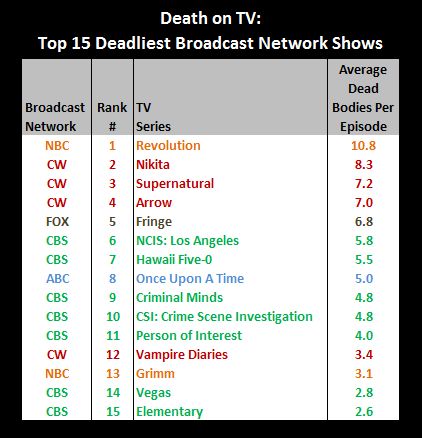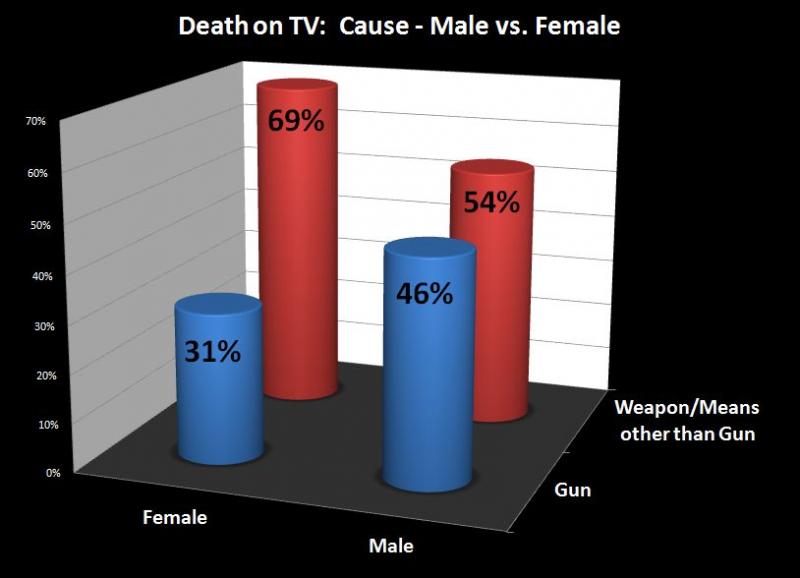TV Body Count Study Results for Fall 2012: Commentary & Conclusions
Why Count Dead Bodies on TV?
We all know that we get a heavy dose of death on television. It’s reported regularly on the news where it’s very real and quite disturbing. But when death is not as real as on dramatic TV shows, we find it entertaining – why else would we be watching? Our study shows that death is an integral component of many popular TV series.
Since we already know all that, why bother counting dead bodies seen on TV? Well, first of all, nobody has done it as far as we can tell. We won’t know what might be learned unless we do it. Our study aimed to provide information on the role of death in our popular culture and how it might affect our real lives. We chose to study television because we feel that TV is a good reflection of what’s popular, and we decided to count dead bodies because it’s a measurable representation of death.
We hope that the information gained through these studies will lead to new insights into our collective view of death and promote meaningful discussion. It might offer clues to questions such as: What impact does death in popular media have on violence in today’s society? Does death as fictionalized on TV help us deal with our own mortality or make it more difficult? Since the dead are rarely memorialized on TV, does it make us less likely to attach importance to funerals? If what’s on TV is a reflection of our society, what does it say about us when there is so much death on TV shows? Should we be worried?
What did we find?
 We expected to find a fair number of dead bodies on TV but having completed 2 studies we are surprised by just how much death we have seen. As outliers, it’s easy to dismiss the high body counts of the shows that top our list. The deadliest shows of our 2 studies (The Walking Dead, Spartacus, Game of Thrones, and Strike Back) are premium cable shows, which draw relatively smaller audiences. Also, premium cable is known to “push the envelope.” But popular prime-time series on broadcast networks regularly show 3, 4, 5, or more dead bodies in a single episode. That’s a heavy dose of death on “free” prime-time TV, especially considering the vast majority of TV deaths are due to violence.
We expected to find a fair number of dead bodies on TV but having completed 2 studies we are surprised by just how much death we have seen. As outliers, it’s easy to dismiss the high body counts of the shows that top our list. The deadliest shows of our 2 studies (The Walking Dead, Spartacus, Game of Thrones, and Strike Back) are premium cable shows, which draw relatively smaller audiences. Also, premium cable is known to “push the envelope.” But popular prime-time series on broadcast networks regularly show 3, 4, 5, or more dead bodies in a single episode. That’s a heavy dose of death on “free” prime-time TV, especially considering the vast majority of TV deaths are due to violence.
While we only have two seasons to compare, the trend is that the body count is growing. Our tally showed a 12% increase in the 2nd study. Some shows upped the ante, and there were new series such as Revolution, a new addition to NBC’s lineup in the Fall that averaged nearly 11 dead bodies per episode. Anecdotally, Fox’s new series, The Following (premiering after this study was completed), opened with a bang in ratings, blood, and guts. If this past year is any indication, then it’s safe to say that death and violence are increasing on TV.
In the sci-fi/fantasy genre, body counts can be huge. Do we perceive death differently if the body belongs to a human or a non-human? Is it considered OK to kill a zombie or a vampire? We can’t say, but it’s interesting that non-humans are more likely to die from a blade of some kind, which seems to be a more gruesome way to go. Certainly, the genre is going strong, with networks such as ABC fully embracing it (Grimm, Once Upon A Time, 666 Park Avenue). It could mean bigger body counts in the future.
And what about the guns? Our study clearly shows that guns are fired frequently in today’s most popular dramas. Gunshots are the primary cause of death for human males on TV. Is there more gun violence on TV than there has been in the past? We can’t conclusively answer that because our first study didn’t track the cause of death. However, this is a timely question, and we hope to look deeper into it as we develop our survey data.
 Finally, can we draw anything from the difference in how men and women die on TV? The vast majority of dead bodies are male. That’s not a big surprise. What is interesting is that on TV, men die by guns almost 50% of the time, whereas women die 70% of the time by other means, including beatings and strangulation. Do we view the victimization of women differently, or does it just reflect reality?
Finally, can we draw anything from the difference in how men and women die on TV? The vast majority of dead bodies are male. That’s not a big surprise. What is interesting is that on TV, men die by guns almost 50% of the time, whereas women die 70% of the time by other means, including beatings and strangulation. Do we view the victimization of women differently, or does it just reflect reality?
Conclusions: Does the Portrayal of Death on TV Affect Your Attitudes Toward Death in Life?
We didn’t need this study to conclude that there is death and violence on television. But now it’s not just a subjective judgment; we have objective data to put to it. We know more about how death is portrayed on TV — how often it occurs, who is victimized, and how they die. Having actual data provides substance and perspective to any discussion of death as seen on TV.
Our intent with this study is not to pass judgment on the TV shows that portray death and violence. After all, we must like these shows because those of us who participated in this study watch them regularly anyway. But the topic of death, dying, and violence in the  media is relevant, and we expect that questions surrounding how we deal with this element of popular culture will only get more vibrant as we move forward. While our Body Count Studies may not provide groundbreaking evidence supporting any particular viewpoint on the issue, we hope that the data from our studies will fill a piece of the puzzle.
media is relevant, and we expect that questions surrounding how we deal with this element of popular culture will only get more vibrant as we move forward. While our Body Count Studies may not provide groundbreaking evidence supporting any particular viewpoint on the issue, we hope that the data from our studies will fill a piece of the puzzle.
What can you do? As you watch your favorite programs, note how death is portrayed. How does it make you feel? Does it affect your attitudes toward death in any way? Should we be concerned about life imitating art? It’s something to think about, something to discuss.
TV Series Included in the Study for Fall 2012
BroadcastChicago Fire (NBC)
| 666 Park Avenue (ABC) |
| Castle (ABC) |
| Last Resort (ABC) |
| Once Upon A Time (ABC) |
| Revenge (ABC) |
| Blue Bloods (CBS) |
| Criminal Minds (CBS) |
| CSI: Crime Scene Investigation (CBS) |
| CSI New York (CBS) |
| Elementary (CBS) |
| Hawaii Five-O (CBS) |
| NCIS (CBS) |
| NCIS Los Angeles (CBS) |
| Person of Interest (CBS) |
| The Mentalist (CBS) |
| Vegas (CBS) |
| Bones (FOX) |
| Fringe (FOX) |
| The Mob Doctor (FOX) |
| Grimm (NBC) |
| Law & Order: Special Victims Unit (NBC) |
| Revolution (NBC) |
| Arrow (CW) |
| Beauty and the Beast (CW) |
| Nikita (CW) |
| The Vampire Diaries (CW) |
| Supernatural (CW) |
Cable
| The Walking Dead (AMC) |
| Copper (BBCA) |
| American Horror Story: Asylum (FX) |
| Sons of Anarchy (FX) |
| Haven (SYFY) |
| Major Crimes (TNT) |
| Covert Affairs (USA) |
| Burn Notice (USA) |
Premium Cable
| Strike Back (Cinemax) |
| Boardwalk Empire (HBO) |
| Dexter (Showtime) |
| Homeland (Showtime) |
Key Findings
Guns, Blades, & Other Causes of Death

